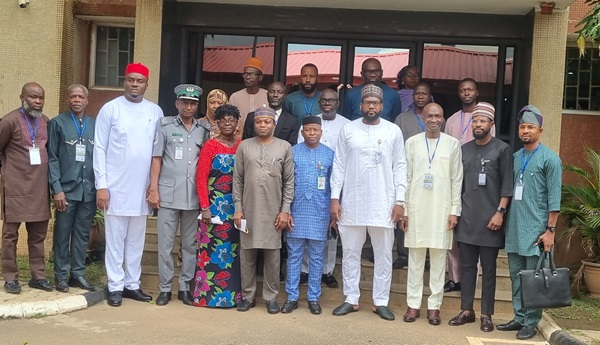
The Standards Organisation of Nigeria (SON), in collaboration with the Energy Commission of Nigeria (ECN) and the United Nations Environment Programme (UNEP), has convened a technical committee to review the minimum energy performance standard (MEPS) for air conditioners (ACs) in Nigeria.
This initiative aims to enhance energy efficiency and promote climate-friendly cooling solutions, contributing significantly to Nigeria’s climate goals and sustainable energy access.
Director-general of the ECN, Dr. Mustapha Abdullahi emphasised the significance of this gathering during the committee’s presentation in Abuja. “This significant gathering is focused on reviewing the MEPS for air conditioners in Nigeria, a crucial component of the project, ‘Scaling Up Energy-Efficient and Climate-Friendly Cooling in Nigeria’s Nationally Determined Contribution Revision,'” he said.
Abdullahi highlighted the collaborative efforts between the ECN, SON, UNEP and the Clean Cooling Collaborative (CCC) in diligently working on this project. The review process began with a successful stakeholders’ workshop on May 15, 2024. The discussions and recommendations from that workshop underscored the urgent need to revise and elevate the current MEPS for air conditioners in Nigeria. “Today, we continue this journey, further solidifying our commitment to energy efficiency and environmental stewardship,” he added.
The recommendations from the committee will shape the future of air conditioning standards in Nigeria, driving advancements in energy efficiency, reducing greenhouse gas emissions, and fostering sustainable economic growth. “Our work will influence the national standard and contribute to the global commitment to combat climate change,” Abdullahi stated.
Director-general of SON, Dr. Ifeanyi Okeke underscored the importance of the collective mission to enhance energy efficiency and promote sustainable development in Nigeria. Represented by Engr. Olalekan Omoniyi, Okeke noted that the committee’s focus on air conditioners and refrigerators would contribute significantly to Nigeria’s energy efficiency landscape and set a standard for other African countries to follow. “Following the success of the lighting standards, we extended our focus to air conditioners and refrigerators. Our pioneering efforts in these areas gained regional recognition, leading ECOWAS to adopt our standards as part of the ECOSTAND 071 series,” he explained.
However, challenges remain. The ECOWAS standards have yet to receive formal approval, and associated labels need to be reviewed for harmonisation across all ECOWAS markets. Okeke emphasised the importance of technological advancements in the air conditioning industry, particularly the shift from Energy Efficiency Ratio (EER) to Seasonal Energy Efficiency Ratio (SEER) as the preferred metric. This shift, driven by the need to measure energy efficiency over a range of operating conditions, necessitates a thorough review of existing MEPS to ensure they remain relevant and effective.
“The objective of the committee is to establish revised MEPS for air conditioners that reflect current technological advancements and position Nigeria competitively on the global stage,” Okeke stated. “This revision is not just about meeting today’s needs but anticipating and preparing for the future to enable Nigeria to participate in continental and global trade—the AfCFTA and WTO. By setting appropriate standards for energy efficiency, we are not only contributing to global efforts to combat climate change but also enhancing Nigeria’s reputation as a leader in sustainable energy solutions, potentially attracting more international investments and partnerships.”
The project manager, energy efficiency and cooling specialist at UNEP, Mr. Marco Duran highlighted the importance of scaling up sustainable cooling projects in Nigeria. He assured that UNEP would support the country in achieving zero emissions by 2030 by setting up a reconditioning market towards energy efficiency.
Chairman of the technical committee on household appliances, Engr. Nelson Chukwu emphasised the committee’s mission to enhance the energy efficiency of household appliances, particularly air conditioners, promoting sustainable energy consumption across Nigeria. “This initiative is not merely a regulatory exercise but a pivotal step towards achieving our broader goals of energy conservation, environmental sustainability and economic resilience,” he said.
The objectives of the committee’s meeting include the review of draft MEPS, promotion of energy efficiency, stakeholder engagement to power up collaboration and making recommendations to the Standards Council. “The standards we set today will have a lasting impact on the sustainability and prosperity of Nigeria,” Chukwu assured. “We aim to reduce energy consumption, lower greenhouse gas emissions, and mitigate the impact of climate change. Our standards should encourage innovation and the adoption of advanced technologies that promise not only economic benefits but also environmental stewardship.”
The committee’s work is a critical piece of the puzzle in building a future where energy is used wisely, industries thrive in harmony with the environment, and every Nigerian enjoys the benefits of responsible energy consumption. This collective effort is crucial for driving advancements in energy efficiency and environmental sustainability, ultimately contributing to Nigeria’s long-term economic and environmental goals.

